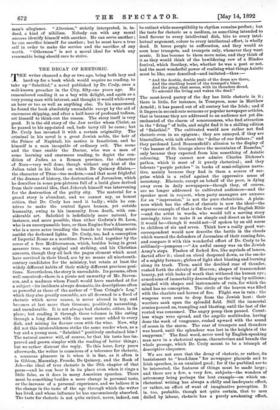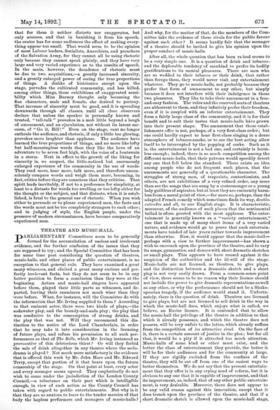THE DECAY OF RHETORIC.
THE writer chanced a day or two ago, being both lazy and hard-up for a book which would require no reading, to take up "Salathiel," a novel published by Dr. Croly, once a well-known preacher in the City, fifty-one years ago. He remembered reading it as a boy with delight, and again as a very young man with interest, and thought it would while away an hour or too as well as anything else. To his amazement, he found the book absolutely unreadable except by the aid of enormous skipping, and after a half-hour of profound tedium, set himself to think-out the reason. The story itself is very good. It is the old story of the Jew reviler whom Christ, as he passed to his appointed end, bade tarry till he came; bat Dr. Croly has invested it with a certain originality. The criminal in his novel is a great Jewish noble, the heir of the Prince of Naphtali, his motive is fanaticism, and he himself is a man incapable of ordinary evil. The scene and the time enable the Doctor, who was a man of some learning and enormous reading, to depict the con- dition of Juda3a as a Roman province, the character of Nero—very well done, though without any hint of the Julian taint in his blood on which De Quincey dilates,— the character of Titus—too modern,—and that most frightful of the dramas of history, the destruction of Jerusalem, which he describes in some pen-pictures full of a lurid glare derived from their central idea, that Jehovah himself was intervening for the destruction of the guilty city. The material for a grand story is abundant, and we cannot say, as honest critics, that Dr. Croly has used it badly ; while he con- trives to make the central figure human, yet outside humanity, owing to his immunity from death, with con- siderable art. Salathiel is indefinitely more natural, for instance, and more possible, than either Godwin's St. Leon, who is an unsurpassable bore, or than Eugene Sue's Ahasuerus, who is a mere actor treading the boards to trembling music amidst the darkened lights. Dr. Croly, too, had a conception of Imperial Rome as a maritime Power, held together by the nexus of a free Mediterranean, which, besides being in great measure true, was original and striking, and his Christian converts, though they all lack the pagan element which must have survived in their blood, are by no means all nineteenth- century candidates for the ministry, but retain at least the widely different habits of their vridely different previous posi- tions. Nevertheless, the story is unreadable. Its persons, often well conceived—there is a pirate not unworthy of Mr. Steven- son, and a madman whom Fuseli would have snatched at for a subject—its incidents always dramatic, its descriptions often as powerful as those of the author of "Tom Cringle's Log," which they also greatly resemble, are all drowned in a flood of rhetoric which never ceases, is never altered in key, and becomes at last more than tiresome, positively nauseating, and unendurable. It is not always bad rhetoric, either, in its place ; but reading it through three volumes is like eating through a long dinner, with the same sauce added to every dish, and mixing its flavour even with the wine. Now, why did not this intolerableness strike the same reader when, as a boy and a young man, "Salathiel" positively enchained him? The natural answer will, of course, be that his taste has im- proved and grown simpler with the reading of better things ; but we rather distrust the reply. To this hour, forty years afterwards, the writer is conscious of a tolerance for rhetoric, a sensuous pleasure in it when it is fine, as it often is in Gibbon, Macaulay, Froude, De Qaincey, and the Book of Job—the ideal of true rhetoric is the 38th chapter of that poem—and he can bear it in its place even when it rings a little false, as it does in many American speeches. There must be something besides a mere change in personal taste, or the increase of a personal experience, and we believe it is the change in the taste of the age through which the writer has lived, and whose influence he has unconsciously absorbed. The taste for rhetoric is not quite extinct, never, indeed, can
be extinct while susceptibility to rhythm remains perfect; but the taste for rhetoric as a medium, as something intended to lend flavour to every intellectual dish, bite to every intel- lectual argument, colour to every intellectual effort, is wholly dead. It bores people to suffocation, and they would as soon hear trumpets, and trumpets only, whenever they want music. It has become to them mere noise, and they think of it as they would think of the bewildering row of a Hindoo festival, which Southey, who, whether he was a poet or not, had the most wonderful power of realising what things Asiatic must be like, once described—and imitated—thus :—
" And the double, double peals of the drum are there, And the startling burst of the trumpet's blare, And the gong, that seems, with its thunders dread, To astound the living and waken the dead."
The most-loved poetry of the day has little rhetoric in it ; there is little, for instance, in Tennyson, none in Matthew Arnold ; it has passed out of all oratory but the Irish; and if it lingers in second-rate sermons or popular newspaper articles, that is because they are addressed to an audience not yet dis- enchanted of the charm of sonorousness, who find attraction in the " firing " of bells, and might find it in a shilling edition of "Salathiel." The cultivated would now rather not find rhetoric even in an epigram; they are annoyed, if they are bimetallists, with talk about the "dollar of our fathers ;" and they pardoned Lord Beaconsfield's allusion to the display of "the banner of St. George above the mountains of Ra.sselas," only because they expected from him something of Asiatic colouring. They cannot now admire Charles Dickens's pathos, which is most of it purely rhetorical ; and they tolerate "purple patches" in books of semi-religious narra- tive, mainly because they find in them a source of sur- prise which is a relief against the oppressive sense of monotony. Rhetoric, except on behalf of the poor, is dying away even in daily newspapers—though they, of course, are no longer addressed to cultivated audiences—and the speaker most in request, when party managers are anxious for an "impression," is not the pure rhetorician. A plain- ness which has the effect of rhetoric is now the ideal—the supreme example of that is the first verse of the English Bible —and the artist in words, who would tell a moving story movingly, tries to make it as simple and direct as he thinks it would be—though it would not—if spoken by an old nurse to children of six and seven. Think how a really good war- correspondent would now describe the battle in the clouds which warned the defenders of Jerusalem of their coming fate, and compare it with this wonderful effort of Dr. Croly to be sublimely—pompous :—" An awful enemy was on the Jewish Army's steps. Flashes of forked fire, like myriads of lances, darted after it; cloud on cloud deepened down, as the smoke of a mighty furnace; globes of light shot blasting and burning along its track. Then, amid the doubled roar of thunder, rushed forth the chivalry of Heaven; shapes of transcendent beauty, yet with looks of wrath that withered the human eye ; armed sons of immortality descending on the wing by millions ; mingled with shapes and instruments of rain, for which the mind has no conception. The circle of the heaven was filled with the chariots and horses of fire. Flight was in vain : the weapons were seen to drop from the Jewish host : their warriors sank upon the splendid field. Still the immortal armies poured on, trampling and blasting, until the last of the routed was consumed. The angry pomp then paused. Count- less wings were spread, and the angelic multitudes, having done the work of vengeance, rushed upward with the sound of ocean in the storm. The roar of trumpets and thunders was heard, until the splendour was lost in the heights of the empyrean." The final word, never used by English-speaking man save in a rhetorical spasm, characterises and brands the whole passage, which Dr. Croly meant to be a triumph of descriptive eloquence.
We are not sure that the decay of rhetoric, or rather, its banishment to " head-lines " for newspaper placards and to
Irish speeches, is an unmixed good ; for if the purblind are to be interested, the features of things must be made large ; and there are a few, a very few, subjects—the wonders of astronomy being perhaps the best example—on which un- rhetorical writing has always a chilly and inadequate effect, or rather, an effect of want of imaginative perception. It is, too, probable, though not quite certain, that to men dulled by labour, rhetoric has a purely awakening effect,
'that for them it neither distorts nor exaggerates, but -only arouses, and that in banishing it from his speech, the orator has for some audiences the effect of making every- thing appear too small. That would seem to be the opinion of most Labour leaders, Socialists, Anarchists, and preachers of the Salvation Army, for they cannot all be using rhetoric only because they cannot speak plainly, and they have very large and very varied experience as to the results of speech. In the main, however, the decadence of rhetoric must be due to two acquisitions,—a greatly increased sincerity, and a greatly enlarged power of seeing the true proportions of things. A dislike of histrionics except upon the stage, pervades the cultivated community, and has killed, among other things, those exhibitions of exaggerated sensi- bility which Miss Burney thought only becoming the fine characters, male and female, she desired to portray. That increase of sincerity must be good, and it is spreading downwards through all classes, until all close observers -declare that unless the speaker is personally known and trusted, " tall-talk " provokes in a mob little beyond a laugh of amusement, and an ejaculation, not without its latent sar- casm, of "Go it, Bill!" Even on the stage, rant no longer enthrals the audience, and rhetoric, if only a little too glowing, provokes more laughter than applause. The audience have learned the true proportions of things, and no more like lofty but half-meaningless words than they like the hero of an adventure to be seven feet high, with the voice of a boatswain in a storm. Next in effect to the growth of the liking for sincerity is, we suspect, the little-noticed but enormously enlarged experience of the community in the use of words. They read more, hear more, talk more, and therefore uncon- sciously compare words and weigh them more, becoming, in fact, critics before they are conscious that they criticise. That spirit leads inevitably, if not to a preference for simplicity, at least to a distaste for words too swelling or too lofty either for the thought or the subject, and that distaste, when it is estab- lished, is fatal to the general use of rhetoric. When you wish either to persuade or to please experienced men, the facts and the words must not be too completely strangers to each other; and in judging of style, the English people, under the pressure of modern circumstances, have become comparatively experienced men.







































 Previous page
Previous page